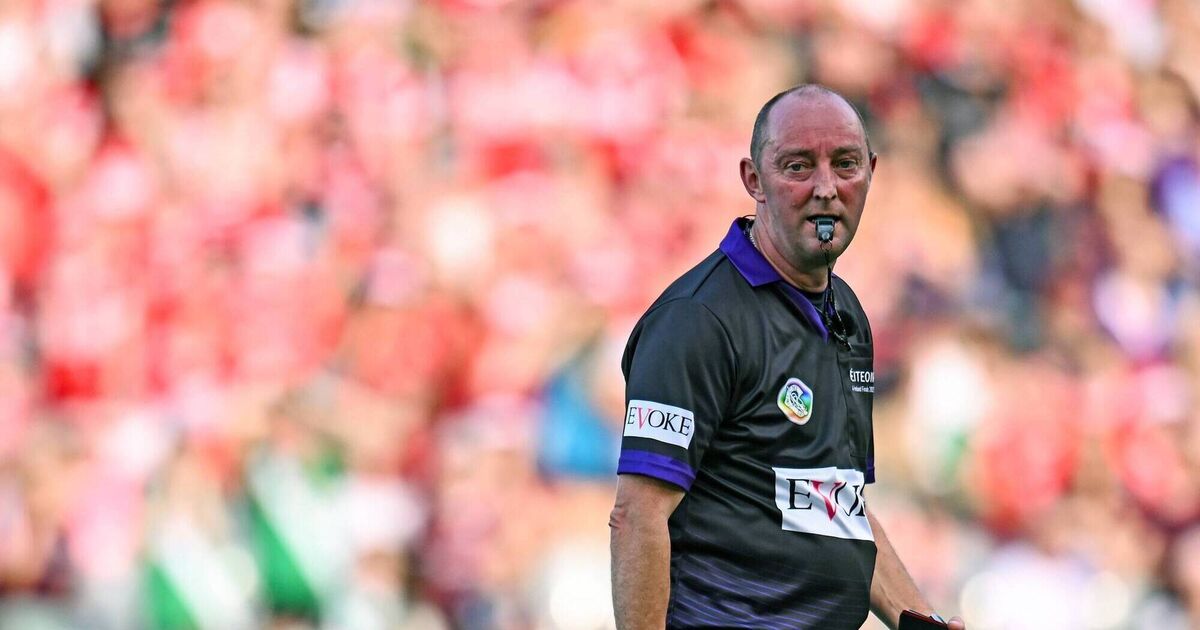In the endless theatre that is sport, history has a curious habit of repeating itself. Read the quote, guess the year.
“We won the All-Ireland final, but the main talk was about the referee, was it a controversial free at the end.”
This was six years ago. Cork were closing in on a three-in-a-row, star full-back Laura Treacy had rewatched their 2018 decider against Kilkenny and deemed something amiss. In 2019, their championship ended at the hands of eventual champions Galway. By a single point. Déjà vu.
“He reffed [according] to the rules of the game,” said Treacy at the time. “But when people are watching it they are viewing it as hurling. They are watching a camogie game as if it is hurling and that is how the whole, ‘Why is he blowing for that?’ and ‘Would he not let that go?’ came up. I think the rules have to change.” Across numerous interviews with television, print and radio outlets, Cork manager Ger Manley hit out at the “shocking” and “awful” decisions that went against his side last Sunday.
The crucial difference between 2019 and last weekend is the rulebook. Previously, it failed to reflect how the game was evolving and how players were preparing. Sweepers and strength and conditioning became fashionable, just as they did in hurling, but without the necessary legislation to weaponise or counteract them. The resulting clash was awkward and uneven. It needed to break free from these self-imposed chains.
On Sunday, Galway and Cork produced a thrilling contest that had 48 shots and a remarkable 83 turnovers. 2-13 of the scores came from play. The final tally from placed balls was 0-7 each, albeit Cork did miss an early penalty, but Amy O’Connor managed to register something on the board from the subsequent 45.
Even still, the complaining and criticism duly came for the matchday official Justin Heffernan. Successful Galway boss Cathal Murray called for more physicality, urging lawmakers to tackle the charging rule. Meanwhile, one incident Manley was correct to take issue with was a clear push on goalkeeper Amy Lee in the first half, excessive physicality.
This is the tightrope hurling referees have had to walk too. There is a constant demand to let the game flow while maintaining order at the same time. Strict enforcement can come at the cost of the spectacle, lax application can be damaging for the sport. This year’s Munster final was exhibit A. If that level of leniency is consistently applied, does that change the shape of the game and its key players? Undoubtedly.
The tackle is an enormous challenge across all four codes. Players are now coached to make body contact at all costs. It is the first principle in the manual: delay. Hold up attacking momentum, even if it means throwing your body in front of them. Then ‘deny’, their space and finally, ‘dispossess.’ That means clustering and congestion and crowds of bodies, all stretching the rulebook to its limit.
The GAA has a clockwork calendar and referee complaints are a permanent part of that. Unlike the other regular topics, this grievance isn’t seasonal. The early part of the year is for pre-season competition complaints, challenge game rumours and moaning about too many games jammed together. Structural wrangles, from the number of teams that advance from the Munster championship to preliminary quarter-finals, come after. Split season debate takes over the summer. But referee rows prove evergreen.
It doesn’t seem to matter if those airings are tedious and repetitive. Nor does it matter that there are far more interesting things to talk about. When is the last time both All-Ireland champions won with a sweeper? What of Aoife Donohoe’s inspired display? Why did Cork struggle so badly to progress through midfield before the red card yet find joy there after?
Saoirse McCarthy’s free with four minutes left made it a one-score match. Over the next eight minutes, there were at least 15 full tackles and over 10 turnovers. Bar three sidelines, the whistle only sounded for two frees, one for Cork that led to Orlaith Cahalane’s goal, one for Galway that resulted in Carrie Dolan’s winner.
“I am not sure how many potential frees I could have counted in that last minute of play there,” said RTÉ co-commentator Elaine Aylward with the clock deep in the red. What an up and down game, up and down the field with huge moments.”
That contradiction is constant. Keep the whistle in the pocket and the game breathes, the spectacle swells. Swallow it completely and the modern game is liable to become lawless. Even when a referee somehow manages to find the sweet spot, the only certainty is that there’ll still be someone grumbling about it.

